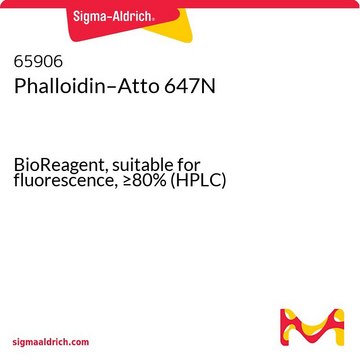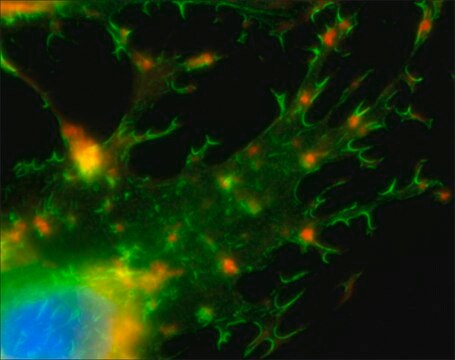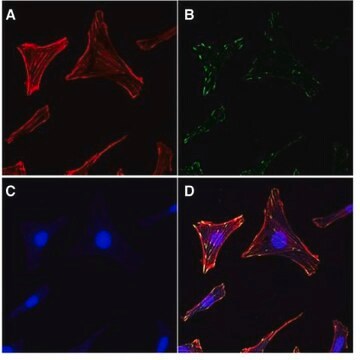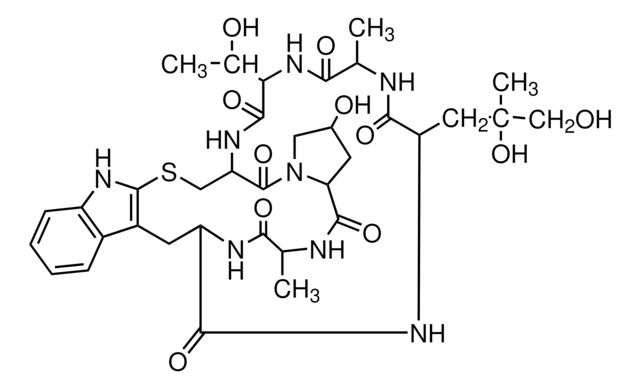Recommended Products
Assay
≥90% (HPLC)
Quality Level
form
solid
mol wt
Mw 1476 g/mol
manufacturer/tradename
ATTO-TEC GmbH
λ
in methanol
UV absorption
λ: 552-558 nm Amax
suitability
suitable for fluorescence
storage temp.
−20°C
General description
Atto 550 is a new label with high molecular absorption (120.000) and quantum yield (0.80) as well as sufficient stoke′s shift (excitation maximum 554 nm, emission maximum 576 nm). Atto 550 can be used with similar excitation source and fluorescence filters as Cy3 TM and is characterized by a high photostability.Phalloidin is a fungal toxin isolated from the poisonous mushroom Amanita phalloides. Its toxicity is attributed to the ability to bind F actin in liver and muscle cells. As a result of binding phalloidin, actin filaments become strongly stabilized. Phalloidin has been found to bind only to polymeric and oligomeric forms of actin, and not to monomeric actin. The dissociation constant of the actin-phalloidin complex has been determined to be on the order of 3 x 10–8. Phalloidin differs from amanitin in rapidity of action; at high dose levels, death of mice or rats occurs within 1 or 2 hours.
Application
Fluorescent conjugates of phalloidin, rhodamine-phalloidin staining reagents, such as Phalloidin–Atto 550 are used to label actin filaments for histological applications. Some structural features of phalloidin are required for the binding to actin. However, the side chain of amino acid 7 (g-dihydroxyleucine) is accessible for chemical modifications without appreciable loss of affinity for actin.
Legal Information
This product is for Research use only. In case of intended commercialization, please contact the IP-holder (ATTO-TEC GmbH, Germany) for licensing.
Storage Class Code
11 - Combustible Solids
WGK
WGK 3
Flash Point(F)
Not applicable
Flash Point(C)
Not applicable
Choose from one of the most recent versions:
Already Own This Product?
Find documentation for the products that you have recently purchased in the Document Library.
Customers Also Viewed
A Choidas et al.
European journal of cell biology, 77(2), 81-90 (1998-12-05)
The product of a GFP-actin gene fusion, permanently or transiently transfected in diverse mammalian cell lines, was shown to be a suitable, intrinsic probe of both the organization and dynamics of the actin cytoskeleton. In live Swiss 3T3 and NIH
Smart-aggregation imaging for single molecule localization with SPAD cameras.
Gyongy, I.; et al.
arXiv (2016)
N Panchuk-Voloshina et al.
The journal of histochemistry and cytochemistry : official journal of the Histochemistry Society, 47(9), 1179-1188 (1999-08-17)
Alexa 350, Alexa 430, Alexa 488, Alexa 532, Alexa 546, Alexa 568, and Alexa 594 dyes are a new series of fluorescent dyes with emission/excitation spectra similar to those of AMCA, Lucifer Yellow, fluorescein, rhodamine 6G, tetramethylrhodamine or Cy3, lissamine
Lorraine Montel et al.
Biophysical journal, 117(3), 408-419 (2019-07-16)
Phagocytosis by macrophages represents a fundamental process essential for both immunity and tissue homeostasis. It consists in the uptake of pathogenic or cellular targets larger than 0.5 μm. For the biggest particles, the phagocytic process involves a massive reorganization of
A Herrera et al.
Materials science & engineering. C, Materials for biological applications, 103, 109760-109760 (2019-07-28)
In the design of macroporous biomaterial scaffolds, attention is payed predominantly to the readily accessible macroscopic mechanical properties rather than to the mechanical properties experienced by the cells adhering to the material. However, the direct cell mechanical environment has been
Our team of scientists has experience in all areas of research including Life Science, Material Science, Chemical Synthesis, Chromatography, Analytical and many others.
Contact Technical Service





